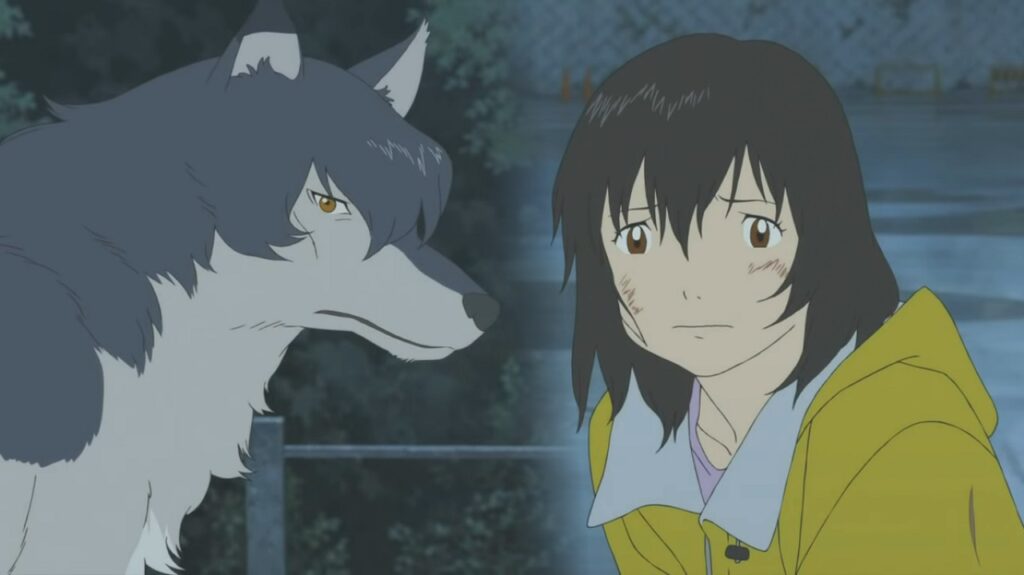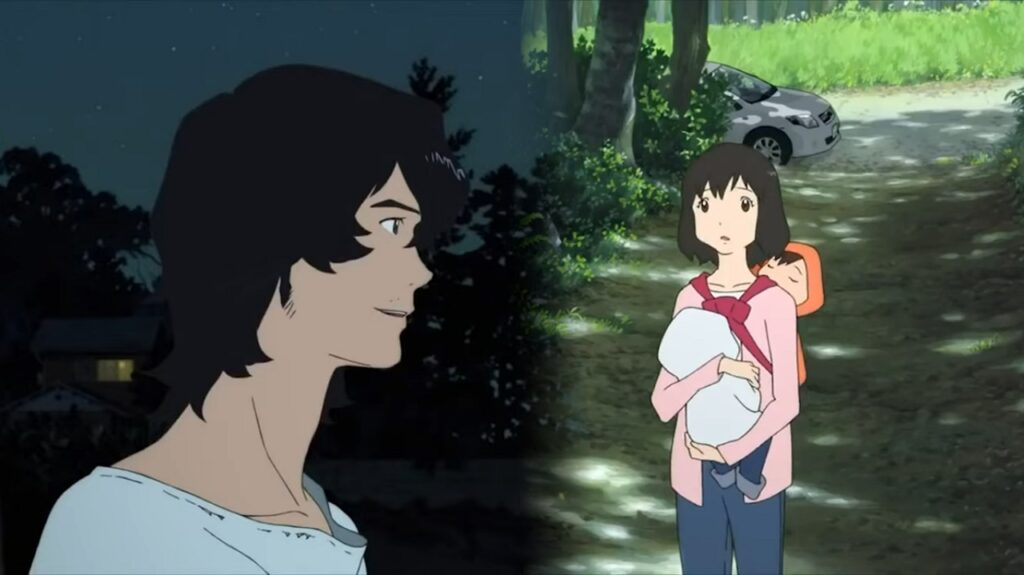This post includes a brief plot summary, an analysis, and a review of the film Wolf Children / Ookami kodomo no Ame to Yuki (2012). Beware of spoilers.
In a world obsessed with conformity, how do you raise children who are inherently different? “Wolf Children”, the 2012 animated gem from director Mamoru Hosoda, challenges our perceptions of normalcy through a young woman’s unusual journey of motherhood.
“Wolf Children” tells the story of a young woman who loses her lover in a tragic accident, leaving her to raise their two infant children on her own.
Hana is having a hard time adjusting to her new life as a single mother. Raising children alone is already a difficult enough task, but when they are wolf-children, it is even harder. Hana’s kids (Ame and Yuki) are hybrids (half-human, half-wolf), a small inheritance from her late partner, a werewolf.
The children’s rowdy nature forces Hana to move to the countryside. She purposely chooses an isolated house to avoid the scrutiny of other people. However, reality hits, and Hana realizes that she is running out of money.
But help comes in the form of a grumpy old man named Nirasaki. With some effort, Hana learns how to farm. Not only does Hana become self-sufficient, but she makes new friendships along the way. As the children grow, we see them struggling with their dual nature and the challenges it brings.
Yuki initially embraces her wolf side but later strives to fit in with human society, while Ame, initially timid, becomes increasingly drawn to his wolf nature. The film ends with Ame choosing to live as a wolf in the mountains, while Yuki decides to continue her life as a human, leaving Hana to come to terms with her children’s diverging paths.
One of the most interesting aspects of “Wolf Children” is its exploration of the wolf-human duality.
Ame and Yuki’s hybrid nature represents a powerful metaphor for the struggle many of us face in reconciling different aspects of our identity.
The wolf side represents our wild, instinctual nature, while the human side embodies societal norms and civilization. Through Ame and Yuki’s journeys, we see the internal conflict of belonging to two worlds and the challenge of finding one’s true self.
Personally, I found Ame and Yuki’s struggles very similar to the ones of immigrant children. They are “born different”, yet they have to learn the customs and traditions of a completely different culture if they desire to “fit in”.
“Wolf Children” brings to light some of the struggles of single parenthood.
Being a single mother is not easy, but Hana rose up to the challenge. Her maternal love and determination enable her to give the children a safe environment to explore who they want to be. The film doesn’t glorify nor victimize Hana’s struggles, instead, it chooses to present the highs and lows experienced by the family.
Given that Hana is raising her children alone, she has to take on roles typically associated with both mothers and fathers. On one hand, Hana is nurturing and protective, but on the other hand, she also teaches her children survival skills and how to navigate the world.
As I see it, this particular approach to parenting is quite progressive in the context of Japanese society, where gender roles can be more rigidly defined and single parenthood is sort of looked down on.
The ending of “Wolf Children” is rather bittersweet.
It’s “sweet” because in the end both siblings were able to find their own path. However, it was also “bitter” to see Hana without her children in the house.
Hana knew from the very beginning that it was not up to her to decide whether she should raise her children as humans or wolves. Ame and Yuki are half-human and half-wolf.
The mother always taught her children not to show their wolf-side in the presence of other people. However, Hana doesn’t do it because she’s ashamed of her children, she fears what others might do to them once they find out about their true nature. That’s why Hana decided to move to the countryside.
In that old abandoned house, Hana found a place where Ame and Yuki could explore what they want to be. Despite wanting to shield them a little longer, Hana decides to send Ame and Yuki to school, which gave the siblings a better insight of what life amongst humans looks like. That experience definitely shaped the siblings and their life choices.
Ame and Yuki are very different.
Despite growing up together, the siblings have very different personalities. One is an extrovert, while the other is an introvert. That alone already dictates a lot about their ability to adapt into society.
While Yuki is very outgoing and makes friends easily, her brother Ame is the complete opposite. The boy likes to hang out in the mountains and has a hard time in school. He doesn’t know how to fit in or to make friends. Therefore, Ame never felt like he belonged in the human world, hence his decision to move into the mountains and live as a wolf.

Ame’s decision to leave is easy to understand but difficult to accept.
In my opinion, Ame should have given a heads-up to his mother. Even if Ame discussed his decision to leave beforehand, it’s very doubtful that Hana would just let him go. As a mother, Hana’s wish is to protect her children as long as she can. That’s why she went after Ame during the storm.
In Hana’s eyes, Ame is still a little boy who needs her help. However, that’s not really the case. As a matter of fact, when Hana tripped and fell, it was Ame who saved her and brought her to safety. Despite being a young boy in the human world, Ame is already an adult in the wolf world.
Seeing her son leaving definitely broke Hana’s heart. As a mother, she most likely thought she didn’t do enough for Ame, but that’s not true. When Ame ran to the highest part of the mountain, he was trying to prove his mother wrong.
Ame wanted to show Hana that none of it would have been possible without his mother’s love and patience while she was raising him. That was the only gift that Ame ever needed from his mother.
After learning more about the wildlife, Ame realized that he wants to spend the rest of this life as a wolf. Ame’s final decision to leave the human world was heavily influenced by his mentor (the fox). Despite leaving the house, Ame is still around, as Hana hears his howls from time to time.
Sohei was the one who made Yuki realize she doesn’t need to hide herself.
Turns out, Sohei always knew about Yuki’s wolf-side. He saw who his attacker was. Nonetheless, it never occurred to Sohei to tell other people about Yuki’s true nature. Seeing that Sohei kept her “secret” all these years made Yuki realize that she doesn’t need to be ashamed or afraid of her wolf-side.
While not everyone will accept Yuki as she is, some will, just like her friend Sohei. In addition, Yuki’s social nature is stronger than Ame’s. The girl has friends and feels loved by them. Therefore, leaving everything behind was not an option that would make sense for someone like Yuki.
The most tragic scene in “Wolf Children” wasn’t Ame leaving his mother.
In my opinion, the most upsetting scene in the entire film was the sudden death of the children’s father. Seeing Hana completely helpless in that situation was heartbreaking. So, not only was her partner dead, but Hana had to watch the garbage men dump the dead body into the trunk, which took away Hana’s right of giving a proper burial to her man.
The second most tragic scene in “Wolf Children” was hearing Hana say she didn’t do enough for Ame. That only proves what a great mother Hana is. Taking the children to the countryside was definitely the best for them.
Away from other humans, Ame and Yuki had plenty of space to let their wolf-side out. There was never a single moment where Hana repressed her children and forced them to make a choice. She always made it very clear that it was up to them to choose whatever they wanted to be.
Final Thoughts
“Wolf Children” is a well-crafted tale that is as much about growing up as it is about letting go. What I appreciate about the film is that it doesn’t present a single “right” path. Watching Yuki and Ame making completely different life choices sent a heartwarming message: “true belonging often starts with self-acceptance”.
Another aspect that I really enjoyed about “Wolf Children” was its balance between dramatic and light-hearted scenes. Although the film has some pretty sad and emotional scenes, there are also some pretty funny moments, especially when the kids are growing up. If the film was just sad all the way through, then it would’ve been a very dreadful watch.
Overall, “Wolf Children” is a very interesting film. It deals with sensitive themes such as identity, single parenthood, and grief without overdoing it, making the story realistic and relatable. Last but not least, the soundtrack is beautiful, and it really helps to cement the story in people’s heads.
Final Rating: 




